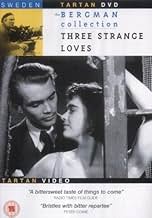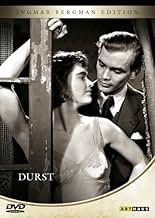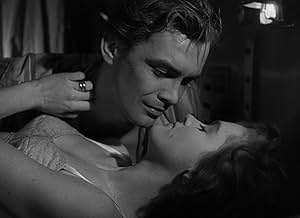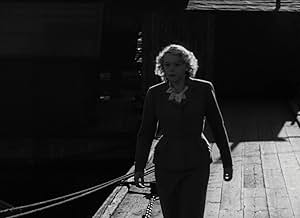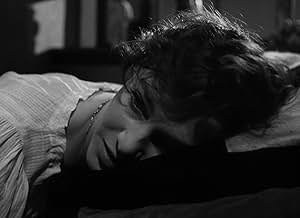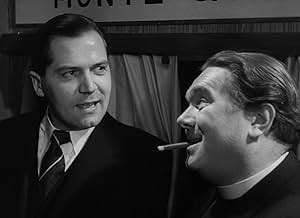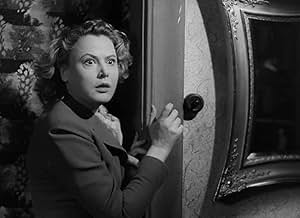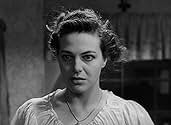PUNTUACIÓN EN IMDb
6,5/10
3 mil
TU PUNTUACIÓN
Una pareja dependiente que pasa por una crisis matrimonial regresa a Estocolmo después de un viaje a Italia. Paralelamente, una viuda se resiste a las seducciones de otras dos personas: su p... Leer todoUna pareja dependiente que pasa por una crisis matrimonial regresa a Estocolmo después de un viaje a Italia. Paralelamente, una viuda se resiste a las seducciones de otras dos personas: su psiquiatra y una amiga lesbiana.Una pareja dependiente que pasa por una crisis matrimonial regresa a Estocolmo después de un viaje a Italia. Paralelamente, una viuda se resiste a las seducciones de otras dos personas: su psiquiatra y una amiga lesbiana.
- Dirección
- Guión
- Reparto principal
Mimi Nelson
- Valborg - Ruts kamrat i balettskolan
- (as Mimmi Nelson)
Carl Andersson
- En man i kupén med festande tågpassagerare (1)
- (sin acreditar)
Wiktor Andersson
- Doorkeeper
- (sin acreditar)
Verner Arpe
- Tysk biljettsamlare
- (sin acreditar)
Ingmar Bergman
- Tågpassagerare
- (sin acreditar)
Britta Brunius
- Sjuksköterskan efter Ruts abort
- (sin acreditar)
Calle Flygare
- Den danske prästen på tåget
- (sin acreditar)
Inga Gill
- Lady at Hotel
- (sin acreditar)
Herman Greid
- Stadsbudet i Basel
- (sin acreditar)
Helge Hagerman
- Den svenske prästen på tåget
- (sin acreditar)
Reseñas destacadas
I thought I had seen every Bergman film ever made, so I was thrilled to stumble onto this one the week after he died. I had no trouble following the intertwining stories because I kept track of the characters' names and their relationships. So what confused many viewers seemed totally justified, especially compared to films in our post-Altmam era where more and more we see "stories" where seemingly unconnected people's lives crisscross and are junxtaposed ("Magnolia," and "Babel" to name a few).
The filming is fantastic for the time and prefigures the use of close ups in "Through a Glass Darkly." Very different from "Port of Call" just before and "To Joy" just afterwards. I found the film less bleak than "Prison," its lyrical moments prefiguring "Summer Interlude," one of my favorite early Bergmans.
The lesbianism was blatant enough for me, much more obvious than in "Young Man With A Horn," made around the same time in the US. Curiously, this section of the film helped illuminate Bergman's use of the theme in "The Silence," and this makes me want to view that film again. The fact that this is a film Bergman didn't write is intriguing, because he harmonizes his visual language to the rhythms of the screenwriter's oral one. The dialog was rather light for the seriousness of the situations. Perhaps Bergman himself would have been heavier-handed.
Lastly, there are the actresses, and here Bergman's direction of actors seems to solidify, as I find his previous films much more uneven on this score. Here the women, especially the young dancer, show real depth.
Keep in mind that this is not his first film, but still an early work, a seed that will grow into later masterpieces. Then you won't be disappointed, even after the mediocre last minutes of a work that definitely showed promise.
The filming is fantastic for the time and prefigures the use of close ups in "Through a Glass Darkly." Very different from "Port of Call" just before and "To Joy" just afterwards. I found the film less bleak than "Prison," its lyrical moments prefiguring "Summer Interlude," one of my favorite early Bergmans.
The lesbianism was blatant enough for me, much more obvious than in "Young Man With A Horn," made around the same time in the US. Curiously, this section of the film helped illuminate Bergman's use of the theme in "The Silence," and this makes me want to view that film again. The fact that this is a film Bergman didn't write is intriguing, because he harmonizes his visual language to the rhythms of the screenwriter's oral one. The dialog was rather light for the seriousness of the situations. Perhaps Bergman himself would have been heavier-handed.
Lastly, there are the actresses, and here Bergman's direction of actors seems to solidify, as I find his previous films much more uneven on this score. Here the women, especially the young dancer, show real depth.
Keep in mind that this is not his first film, but still an early work, a seed that will grow into later masterpieces. Then you won't be disappointed, even after the mediocre last minutes of a work that definitely showed promise.
While Ode to Joy is undoubtedly the gem of Eclipse's Early Bergman box set, Thirst is a close second, at least in my mind. It's kind of a precursor to Scenes of a Marriage, where the story follows a married couple (played by Eva Henning and Birger Malmsten) on a train trip through war-torn Europe. The tumult of the film comes not from the mostly ignored outside world, but from the rocky marriage itself. We also get glimpses of the couple's former lovers. The film is at its best when sticking to the couple. When it strays to the stories of side characters, it's weaker. Since the film is so short (just over 80 minutes), you have to wonder if some of the tangential stories were added as padding. But even the scenes that don't add much are well written, acted and directed. Henning gives a masterful performance, and Bergman was really coming into his own by this point.
Women on the verge of a nervous breakdown, men looking for dominance, acted out on a small scale: Here, Bergman serves up some technical and contentual elements which can be found throughout his later career. Several short stories written by Birgit Tengroth, who is playing Viola here, are melded, with the main plot involving Rut (Eva Henning) and Bertil (Birger Malmsten). But as soon as the couple arrives the train which will take them on a journey through Europe, Bergman somehow loses all side threads. One can sense how the director exerts to stage his idea of a marital- and love drama, though, it soon appears as a pretty faint attempt and at the end all plot lines remain fragmentarily. The characters and the images, however, linger. They tell the underlying story of Törst and convey this certain feeling of freedom, self-determination, and desire for love presented in a "steely, self-assured, stripped-down directorial style" which is Bergman's very own. That is why with this film one can expect something in the subsequent films of this yet young talent: a great subtlety in cinematic character psychology and lasting, poignant images.
Ingmar Bergman very quickly became one of my favourite directors. Have only been familiar with him since 2012 which was around the period when my film and television taste started to broaden, but it was easy to be intrigued by his distinctive directing style so it was easy to get into his work. Not all his films are great and he was not immune from misfires, but many of them are very, very good and even masterpieces, it is not hard to see why he became such a big influence in cinema.
None of Bergman's late-40s films, when he was still learning his craft and finding his style, are among his best work. It was around the early-mid-50s when he began to come into his own. His early films are still interesting though and there are not really any duds. The most commercially successful of Bergman's early films, 'Three Strange Loves' as called in my country is certainly very intriguing and it is well done in a lot of areas. The story is very flawed and something of a big caveat but 'Three Strange Loves' is fine from a directing standpoint and has a lot to recommend.
'Three Strange Loves' story could have been executed better. The structure is very jumpy, with some constant backing and forthing that was sometimes hard to follow. The flashbacks intrigue mostly but occasionally drag and some could have been placed better and not as randomly introduced or as fragmented.
Do agree as well that the supporting characters' subplots are not as involving as that of the central couple. Some are also not as necessary or as cohesive as others and feel like padding.
On the other hand, 'Three Strange Loves' is well made visually, with the photography being both stylish and atmospheric. Bergman's directing was becoming more refined all the time and there are enough glimmers of brilliance, one can see his distinctive style coming through in some of the more symbolic imagery. The music complements the tone very well and fits appropriately. The script is thought-provoking and sometimes poetic.
Although the story's execution could have been much better, it fascinates thematically with heavy themes not trivialised and actually pretty daringly uncompromising. The tone, revolving around an ahead-of-its-time and not as frequently portrayed back then subject, is bleak and purposefully not a pleasant watch, but the central couple plot is often harrowing and has genuine moments of poignancy. Complete with a strongly written female lead character and the two lead performances are quite powerful.
In a nutshell, well done early on but Bergman went on to much better things. 7/10
None of Bergman's late-40s films, when he was still learning his craft and finding his style, are among his best work. It was around the early-mid-50s when he began to come into his own. His early films are still interesting though and there are not really any duds. The most commercially successful of Bergman's early films, 'Three Strange Loves' as called in my country is certainly very intriguing and it is well done in a lot of areas. The story is very flawed and something of a big caveat but 'Three Strange Loves' is fine from a directing standpoint and has a lot to recommend.
'Three Strange Loves' story could have been executed better. The structure is very jumpy, with some constant backing and forthing that was sometimes hard to follow. The flashbacks intrigue mostly but occasionally drag and some could have been placed better and not as randomly introduced or as fragmented.
Do agree as well that the supporting characters' subplots are not as involving as that of the central couple. Some are also not as necessary or as cohesive as others and feel like padding.
On the other hand, 'Three Strange Loves' is well made visually, with the photography being both stylish and atmospheric. Bergman's directing was becoming more refined all the time and there are enough glimmers of brilliance, one can see his distinctive style coming through in some of the more symbolic imagery. The music complements the tone very well and fits appropriately. The script is thought-provoking and sometimes poetic.
Although the story's execution could have been much better, it fascinates thematically with heavy themes not trivialised and actually pretty daringly uncompromising. The tone, revolving around an ahead-of-its-time and not as frequently portrayed back then subject, is bleak and purposefully not a pleasant watch, but the central couple plot is often harrowing and has genuine moments of poignancy. Complete with a strongly written female lead character and the two lead performances are quite powerful.
In a nutshell, well done early on but Bergman went on to much better things. 7/10
Bergman's first foray into marriage - a long visited topic for him. Moving on from a previously familiar summer holiday romance scenario that ends in pregnancy termination, the story shows how the now sterile ex ballet dancer faces frustrations with her new husband. The married soldier that was the subject of her affair (I presume he was killed in action), leaves a widow who comes to haunt her, in spirit and in body.
For Bergman, we see his first slightly bleached-out ultra close up and face to face shot. The psychiatrist too makes a first appearance as emotional damage is pursued as a topic. There's also quite a bit of flash-backing and a train journey that runs through most of it which is supposed to symbolise both a passage in time but also the empty, barren vessel she now feels herself to be.
The distinctively intelligent dialogue that so appeals to me is sharp and acerbic, probably for the first time. "I only stay alive so I can keep you as miserable as you've always kept me" is typical of Ingmar's angst. Subtleties of depressive subjects such as suicide are shown by someone leaping to their death into water but all we hear is a plover or some-such seabird changing its call.
A little lumpy in its narrative but for those who love Bergman, the gems are starting to shine and we are reassured by the burgeoning qualities of who we now know to be one of the World's greatest ever directors.
For Bergman, we see his first slightly bleached-out ultra close up and face to face shot. The psychiatrist too makes a first appearance as emotional damage is pursued as a topic. There's also quite a bit of flash-backing and a train journey that runs through most of it which is supposed to symbolise both a passage in time but also the empty, barren vessel she now feels herself to be.
The distinctively intelligent dialogue that so appeals to me is sharp and acerbic, probably for the first time. "I only stay alive so I can keep you as miserable as you've always kept me" is typical of Ingmar's angst. Subtleties of depressive subjects such as suicide are shown by someone leaping to their death into water but all we hear is a plover or some-such seabird changing its call.
A little lumpy in its narrative but for those who love Bergman, the gems are starting to shine and we are reassured by the burgeoning qualities of who we now know to be one of the World's greatest ever directors.
¿Sabías que...?
- CuriosidadesThe first of three theatrical films directed by Ingmar Bergman that he did not write.
- Versiones alternativasThe Tartan region 2 DVD restores the ending of the scene between Viola and her lesbian former schoolmate Valborg, in which the latter tries to seduce the former by getting her drunk. This had been cut by the Swedish censors before the film's original release and had never been seen publicly before 2004.
- ConexionesReferenced in Dårskapens hus (1951)
- Banda sonoraNon più andrai
(uncredited)
from "Le nozze di Figaro"
Music by Wolfgang Amadeus Mozart
Swedish Lyrics by Bernhard Crusell
Sung by Bengt Eklund
Selecciones populares
Inicia sesión para calificar y añadir a tu lista para recibir recomendaciones personalizadas
- How long is Thirst?Con tecnología de Alexa
Detalles
- Duración1 hora 23 minutos
- Color
- Relación de aspecto
- 1.33 : 1
Contribuir a esta página
Sugerir un cambio o añadir el contenido que falta

Principal laguna de datos
By what name was Tres amores extraños (1949) officially released in India in English?
Responde
